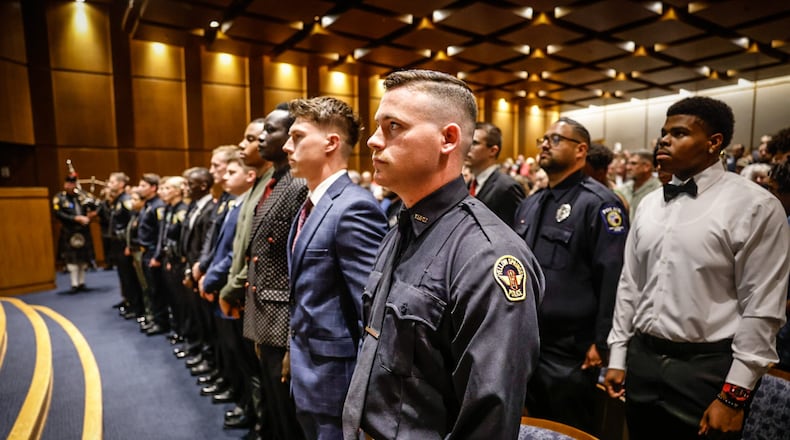It had been six grueling months of Sinclair Police Academy training. They had pushed themselves through physical training, complicated bookwork and high-pressure practical scenarios.
“I will always have the courage to hold myself and other accountable for our actions.”
Now standing on the college auditorium stage on June 12, their forest-green academy shirts were replaced with freshly pressed uniforms from police agencies across the Miami Valley. They stood stiffly at somber attention, each with their right hand raised.
“I will always uphold the Constitution, my community, and the agency I serve.”
And with that, the 19 cadets graduated from Sinclair Police Academy.
Credit: Jim Noelker
Credit: Jim Noelker
For Marine Corps veteran Brent Douglas, a new job was already lined up at the Kettering Police Department (the department jokingly posted to social media a photo of a child seat in a police cruiser with a baby bottle and mini box of donuts, saying they were prepping cars for the new hires).
For Austen Brown, a job with the Beavercreek Police Department carries on a family tradition of policing. His father was a military police officer in the Army.
In addition to Beavercreek and Kettering, they have jobs lined up in West Carrollton, Middletown, Yellow Springs, and sheriff’s offices in Preble and Greene counties. Others have conditional offers.
“As we patrol the streets of our respective cities, let us remember to always be respectful and fair to everyone that we interact with. Let us hold firmly to integrity in everything we do. Let us remember to serve and lead selflessly. Every day in our jobs, we get a chance to be an example,” said cadet Noah Thomas to the members of his graduating class.
All 19 cadets who started the course graduated. Sixteen cadets also received medals for physical fitness, not only passing the fitness requirements needed to graduate the academy, but scoring in the 60th, 70th or 80th percentiles of individuals in their age brackets in pushups, sit-ups, and a mile and a half run.
Their next steps are to take the state certification test. Once that is passed, each cadet will start at their respective departments with a field training officer, the on-the-job training portion of their careers, for about six months.
Then they hit the streets.
“This profession will give you stories to tell for the rest of your lives. It will frustrate you in more ways than you ever imagined. And it will present you with opportunities to make a meaningful impact in the lives of others,” said Kettering Police Chief and keynote speaker Christopher Protsman.
‘Your profession to protect’
Though their time in the academy is over, their learning is not. The field training portion of their careers is where the rubber hits the road, instructors have told cadets, and will rapidly build on their academy training.
Though much has changed in the law enforcement profession in the last ten years, one thing that has not is the need to strive for excellence and the highest integrity in police work.
“These past several years have been difficult for law enforcement. And some of that was caused by our own doing,” Protsman said.
“It’s now your profession to protect,” Protsman said. “There are close to a million sworn law enforcement officers across the country, and sometimes there are some who shouldn’t be wearing a badge. You must maintain unwavering integrity. Hold yourselves, and each other, to the highest ethical standards. The actions of a few tarnish the reputation of all.”
From classroom to beat
In March, this reporter participated in a ride-along with Dayton Police Department Officer Corey Puterbaugh.
Much of the morning of the ride-along was spent patrolling West Dayton in search of abandoned stolen vehicles. In those west Dayton neighborhoods, with rows upon rows of small houses with boarded up, black-painted windows, car thieves will sometimes run out of gas and dump the vehicles for Puterbaugh or other officers to find.
Car thefts, assaults, petty theft, and domestic violence incidents are the bulk of the department’s everyday police work.
Like many large cities, Dayton’s police department has its own academy. Though Dayton’s academy is slightly different than Sinclair’s, Puterbaugh said that the training he received at the academy had “100%” prepared him for this type of work.
Additionally, the experience of being an officer fresh out of the academy — and the steep learning curve — seems fairly universal.
“Your first day on (field training), your first week, it’s pretty basic. You’re just kind of learning the city. But as soon as you start working, you’re taking off like a rocket,” Puterbaugh said.
The road ahead
Academy graduates face a difficult road in law enforcement, not just because of the current political climate, but amid growing research and awareness about the traumatic nature of police work.
A police officer will experience or witness an average of 178 critical incidents, or traumatic events over the course of their career, according to a 2015 study by the Journal of Traumatic Stress. By contrast, the average person experiences two or three in their entire lifetime.
“You will face the elements, harsh weather conditions…you’re going to face verbal abuse, be subjected to every conceivable insult. There will be moments you are treated poorly for no other reason than the uniform you wear,” Protsman said, adding that this is probably why he isn’t allowed to write the recruitment ads.
“Discard the outdated notion that showing vulnerability is a weakness,” Protsman said. “You owe it to yourselves. You owe it to your communities. And most importantly, you owe it to your families to prioritize your wellbeing.”
Credit: Jim Noelker
Credit: Jim Noelker
About the Author



